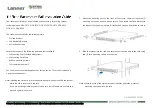
Statistics
5-10
Ring and Station Variables
If a station receives an AMP or SMP MAC frame with the ARI and FCI bits set to 0
without first receiving an intervening AMP frame it recognizes that its upstream
station failed to set the ARI/FCI bits.
The receiving station will increment an ARI/FCI set error counter, and end the
ring poll process by not transmitting an SMP MAC frame. Since it has not
received a valid SMP frame, it does not have a correct NAUN address. However,
stations between the Active Monitor and the malfunctioning adapter will have
correct NAUN addresses.
This error will not cause ring recovery functions to occur. You will probably not
witness this error often, since it is associated with a station hardware problem
rather than a “normal” disruption of ring activity. However, if you do note that a
station’s adapter did not increment the ARI/FCI bits, you might assume that the
adapter is failing or about to fail. You can isolate this error to the upstream
adapter of the reporting station.
Abort Error
These occur when an adapter has frames to transmit and receives a token, but
does not detect an ending delimiter on the token after its access control field. This
indicates that the token is corrupted.
This error will cause the Active Monitor to detect a lost token (since it was not
released back onto the ring) and to restore the ring through the ring purge
process. This error is also somewhat uncommon, and will often indicate a failing
adapter. A common cause of abort sequences is overheating by the adapter in an
overloaded system. Note that the adapter may also issue an Internal Error
simultaneously, which will cause the adapter to remove itself from the ring.
Internal Error
An internal error is counted when a station recognizes a recoverable internal error
in its own adapter (and may temporarily remove itself from the ring). A large
number of internal errors can indicate that one or more stations on the monitored
ring are in marginal operating condition.
Non-Isolating Errors
Non-isolating errors are conditions that could have been caused by any station on
the ring, thus their fault domain cannot be detected. Non-isolating errors include
lost frames, congestion errors, frame copied errors, token errors and frequency
errors.
Lost Frames
A lost frame error is counted each time a station’s TRR (Timer, Return to Repeat)
timer expires before the frame it is transmitting returns. This timer, which is set to
4.1 milliseconds, ensures that each station issues a new token after having
transmitted data.
Summary of Contents for SPECTRUM TRMMIM
Page 1: ...Portable Management Application for the TRMMIM User s Guide The Complete Networking Solution ...
Page 2: ......
Page 8: ...Contents vi ...
Page 16: ...Introduction to SPMA for the TRMMIM 1 8 TRMMIM Firmware ...
Page 90: ...Alarm Configuration 4 10 Setting and Viewing Station Alarms ...
















































